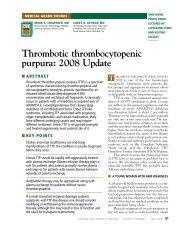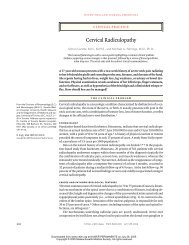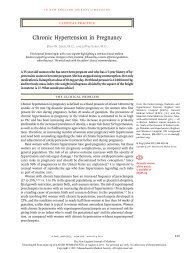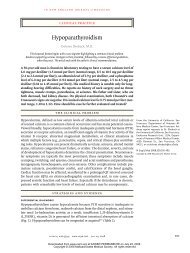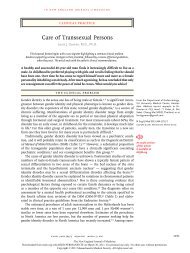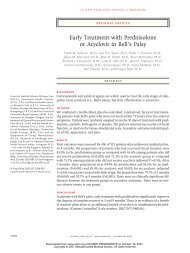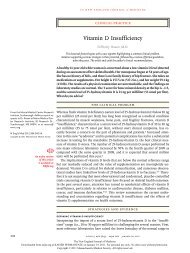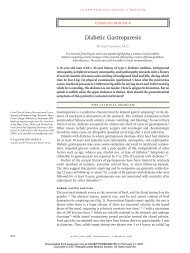Drug-Induced Immune Thrombocytopenia - Q-Notes for Adult Medicine
Drug-Induced Immune Thrombocytopenia - Q-Notes for Adult Medicine
Drug-Induced Immune Thrombocytopenia - Q-Notes for Adult Medicine
Create successful ePaper yourself
Turn your PDF publications into a flip-book with our unique Google optimized e-Paper software.
current concepts<br />
term treatment; the mechanisms of action may<br />
be nonimmune but are poorly understood. The<br />
decrease in platelets is rarely severe enough to<br />
require treatment.<br />
Although chemotherapeutic and immunosuppressive<br />
agents typically cause thrombocytopenia<br />
by suppressing hematopoiesis, they can also<br />
cause immune thrombocytopenia. 23 <strong>Drug</strong>-induced<br />
thrombocytopenia should be suspected, there<strong>for</strong>e,<br />
in patients treated with such drugs if there is an<br />
acute drop in the platelet level after exposure.<br />
<strong>Immune</strong> thrombocytopenia caused by vancomycin<br />
is probably more common than is generally<br />
recognized, and it is easily overlooked in seriously<br />
ill patients because the low platelet count can<br />
be attributed to other causes. 24 In rare cases, the<br />
quinine in tonic water or an aperitif causes immune<br />
thrombocytopenia (“cocktail purpura”). 25<br />
Patho genesis<br />
<strong>Drug</strong>-induced thrombocytopenia, like other idiosyncratic<br />
drug-sensitivity reactions, affects only<br />
a small fraction of patients taking medications<br />
that can trigger the disorder. No predisposing<br />
genetic or environmental factors have been identified,<br />
and no suitable animal models are available.<br />
Mechanisms by which drugs are thought to<br />
cause immune thrombocytopenia are summarized<br />
in Table 3.<br />
<strong>Thrombocytopenia</strong> <strong>Induced</strong> by Quinine<br />
and Other <strong>Drug</strong>s<br />
The hallmark of thrombocytopenia induced by<br />
quinine and many other drugs is a remarkable<br />
antibody that binds tightly to normal platelets<br />
only in the presence of the sensitizing drug. The<br />
epitopes targeted by these antibodies usually reside<br />
on glycoprotein IIb/IIIa or Ib/V/IX complexes,<br />
the major platelet receptors <strong>for</strong> fibrinogen and<br />
von Willebrand factor, respectively. 26,27<br />
Small molecules, like drugs, are thought to be<br />
immunogenic only when linked covalently to a<br />
large carrier molecule, usually a protein. Antibodies<br />
induced by drug–protein adducts are largely<br />
specific <strong>for</strong> the drug (or the small molecule, called<br />
the hapten), although some antibodies recognize<br />
the drug and its carrier molecule. 28 Accordingly,<br />
early investigators assumed that drug-dependent<br />
antibodies found in patients with drug-induced<br />
thrombocytopenia were hapten-specific (or drugspecific).<br />
This may be true of antibodies that<br />
cause hemolytic anemia in patients treated with<br />
massive doses of penicillin 29 and perhaps some<br />
of those that cause thrombocytopenia in patients<br />
given penicillin-like drugs. 30 However, serologic<br />
studies in patients with drug-induced thrombocytopenia<br />
caused by other drugs failed to support<br />
this concept. 31 An alternative hypothesis was<br />
that the drug reacts directly with the antibody to<br />
produce immune complexes that somehow target<br />
Table 3. Mechanisms Underlying <strong>Drug</strong>-<strong>Induced</strong> <strong>Immune</strong> <strong>Thrombocytopenia</strong>.*<br />
Classification Mechanism Incidence Examples of <strong>Drug</strong>s<br />
Hapten-dependent Hapten links covalently to membrane protein Very rare<br />
Penicillin, possibly some cephalosporin<br />
antibody and induces drug-specific immune response<br />
antibiotics<br />
Quinine-type drug<br />
Fiban-type drug<br />
<strong>Drug</strong>-specific<br />
antibody<br />
Autoantibody<br />
<strong>Immune</strong> complex<br />
* The in<strong>for</strong>mation is adapted from Aster. 2<br />
<strong>Drug</strong> induces antibody that binds to membrane<br />
protein in presence of soluble drug<br />
<strong>Drug</strong> reacts with glycoprotein IIb/IIIa to induce<br />
a con<strong>for</strong>mational change (neoepitope) recognized<br />
by antibody (not yet confirmed)<br />
Antibody recognizes murine component of<br />
chimeric Fab fragment specific <strong>for</strong> platelet<br />
membrane glycoprotein IIIa<br />
<strong>Drug</strong> induces antibody that reacts with autologous<br />
platelets in absence of drug<br />
<strong>Drug</strong> binds to platelet factor 4, producing immune<br />
complex <strong>for</strong> which antibody is specific;<br />
immune complex activates platelets through<br />
Fc receptors<br />
26 cases per 1 million users of<br />
quinine per week, probably<br />
fewer cases with other drugs<br />
Quinine, sulfonamide antibiotics,<br />
nonsteroidal antiinflammatory<br />
drugs<br />
0.2–0.5% Tirofiban, eptifibatide<br />
0.5–1.0% after first exposure,<br />
10–14% after second exposure<br />
Abciximab<br />
1.0% with gold, very rare with procainamide<br />
and other drugs<br />
Gold salts, procainamide<br />
3–6% among patients treated with Heparins<br />
unfractionated heparin <strong>for</strong> 7 days,<br />
rare with low-molecular-weight<br />
heparin<br />
n engl j med 357;6 www.nejm.org august 9, 2007 583<br />
Downloaded from www.nejm.org at KAISER PERMANENTE on August 14, 2007 .<br />
Copyright © 2007 Massachusetts Medical Society. All rights reserved.




